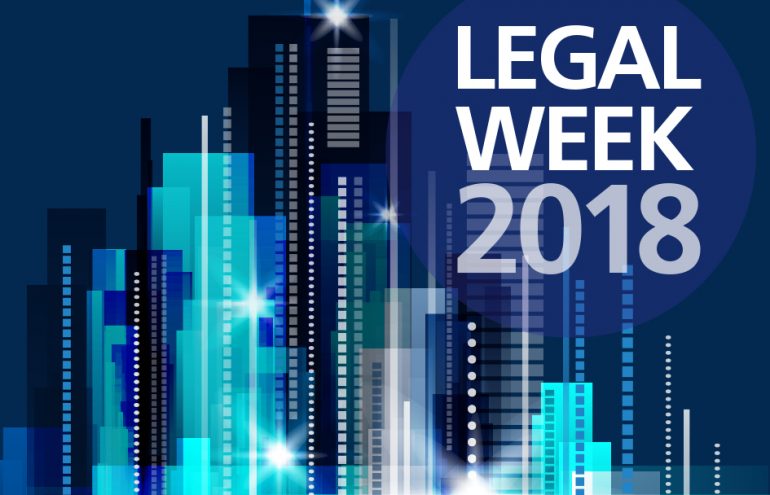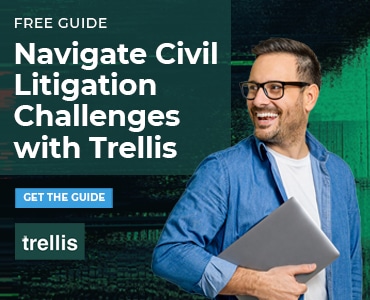Will artificial intelligence be “bigger than fire”? Is anything hotter than cybersecurity? Will swag make a comeback? For this edition of Friday Tech Tips, we asked Larry Bridgesmith, Christy Burke, Andrea Cannavina, Sean Doherty, Justin Hectus and Rebecca Sattin for their top three takeaways from Legalweek 2018, which took place Jan. 30-Feb. 1 in New York City. Here are the legal tech pros’ perspectives on the big event.
Justin Hectus
Legalweek 2018 presented tangible value. The Business of Law, Diversity, Technology, Marketing and CIO tracks coupled with some outstanding keynotes and more diverse panels than I have seen in the past seemed to boost attendance and interest. Everyone seemed to be there, and the meetings around the conference were plentiful. My favorite takeaways were:
The current state of AI adoption, enthusiasm and skepticism was on full display, with AI champions challenging competing products in robot wars and taking the stage to confirm that AI is overhyped and then immediately overhyping it. One panelist paraphrasing Google CEO Sundar Pichai with “AI will be bigger than fire” was a favorite moment. AI will no doubt be transformative, but how and how soon remains an open question.
Cyber and privacy (particularly GDPR readiness) are still the hottest topics of the day-to-day legal technology leader’s agenda. Sessions on these topics were well-attended, the panels were generally excellent, and the solution providers came close to e-discovery vendor numbers in the exhibit hall. My favorite guiding light moment was from Lisa Markey, CISO at Shearman & Sterling, who quoted a colleague with: “When you do risk management properly, compliance is free.”
Shooting for audience participation is ambitious, but worth the risk. It was an honor to participate in a LegalCIO session on innovation with Stuart Barr (of HighQ), Lucy Dillon (Reed Smith), Dan Linna (Michigan State University’s LegalRnD) and an unnamed co-conspirator. We followed Dan’s inspirational leadership in a crowdsourcing “Start | Stop | Continue” exercise that produced a treasure trove of insights on how we as firms (and as an industry) might transform and improve. It was fun and different, and I look forward to more risk-taking on these panels in the future.
Justin Hectus (@justinhectus), a two-time ILTA Distinguished Peer Award winner, is CIO and CISO of Keesal, Young & Logan. Justin’s dual role incorporates development and execution of the firm’s strategic technology vision and leadership of initiatives focused on managing risks for the firm and its clients.
Larry Bridgesmith
After attending several prior events, Legalweek New York 2018 was the best yet. In addition to catching up on great keynotes, panel presentations and exhibit hall chats, the numerous one-on-one conversations with legal tech thought and action leaders were beyond comparison. My key takeaways include:
AI in legal technology has moved from the mountain of hype through the valley of despair to pragmatic adoption at exponential speed. The Raconteur infographic published the same week as Legalweek demonstrates the pervasive influence of AI applications on business in virtually every industry. The constant attention on AI at Legalweek from every perspective validated that AI is now having the same effect on the legal industry.
Collaboration is supplanting competition byte by byte. Collaboration was discussed in both public presentations and private conversations as a necessary element of the move from old law to new law. As data expands exponentially and computing power demonstrates the ability to keep up through applications of AI, blockchain and the Internet of Things, no single discipline can solve big hairy problems alone. At the verge of a Quantum Computing age, working across silos emerges as essential. Legal technology increasingly resorts to API integration and even blockchain applications to bring the value of their solutions into each other’s platforms for the benefit of the attorney user (and ultimately to their clients).
Where were the law schools at Legalweek? Among the notable absentees of our siloed legal industry were law school faculty, administrators and students. How will we improve the implementation of legal tech solutions if law students are not given the opportunity to learn and use these tools? Law schools should be essential participants in the innovation of law through technology. “Thinking like a lawyer” also requires competence in leveraging technology developments and advising clients about protecting their interests in the digital age. (See solivanderbilt.org.)
Larry Bridgesmith (@lbridgesmith) coordinates Vanderbilt Law School’s Program on Law & Innovation and is CEO and co-founder of LegalAlignment, creating DASH, an AI-enabled legal productivity software. Larry’s involvement at the intersection of the theory and practice of law gives him a unique opportunity to look into the silos of the legal industry to discover commonalities which can better serve everyone.
Rebecca Sattin
Here are my top three takeaways from Legalweek 2018:
Security is an ever-present topic that is only going to gain momentum. Sure, there are regulatory concerns driving this — HIPAA, General Data Protection Regulation and so forth — but the increasing threat landscape will ensure this topic is at the forefront of every legal technology conference. This was reflected by the various keynote speakers with security backgrounds like Jeh Johnson, former U.S. Secretary of Homeland Security, and data security expert Brian Krebs.
Cloud is everywhere. It was once thought that adoption of cloud technology in the legal market would proceed at a gradual pace. What we have seen in the last year and what was reflected at Legalweek is that adoption of cloud products is not only proceeding more quickly, but there are far more cloud products in the legal market than there are on-premises products. Reflecting what we saw at the show, at Worldox we are seeing much greater interest from customers in our cloud products.
A more holistic view of technology has, at long last, reached the legal market. No longer are firms looking for a product to solve a problem in a vacuum. The efficiency bug that began several years ago with prompting from clients has finally come to fruition. Law firms are looking at their business processes to see how they can use technology as a tool to make them more streamlined and efficient. With the advent of AI and the new frontier offered by blockchain, I am excited about the future of the legal landscape.
Rebecca Sattin is Chief Information Officer of World Software Corporation. She has more than 25 years of experience in law firm technology and has spoken on topics such as cybersecurity, collaboration and deployment planning at ILTA, LegalTech and other technology forums.
Christy Burke
Legalweek in New York was extraordinary this year, a great chance to connect with colleagues, clients and thought leaders and to learn about the latest developments in legal IT. Here are my top three takeaways:
The LegalCIO session “Driving Digital Transformation and Innovation to Help Improve Collaboration and Productivity” was eye-opening. Distinguished panelists provided insights based on their own experience, but then called for audience participation. We were challenged to think carefully about how to make our own workplaces more process-efficient and smart. We each wrote on sticky notes about which processes we would Start, Stop, Continue and also shared Aha! moments of discovery, all of which revealed surprising results. Even though my company is a PR and marketing firm and not a law firm, I was amazed how similar our problems and solutions were.
Meeting with Zach Warren, Editor-in-Chief of Legaltech News, made me more impressed than ever by Zach and his colleagues’ determination to cover a wide breadth of legal technology stories, in a greater global context. Zach shared that he and his staff will continue to pursue angles focused on the practical use of legal tech, while also seeking out stories concerning diversity and access to justice.
Happy Birthday, Worldox! Document management software provider Worldox/World Software Corp. celebrated its 30th year in business at Legaltech with a great celebration with its original founders Tom and Kristina Burke in attendance. It was abundantly clear that this company has inspired well-earned, exceptional loyalty and appreciation from its constituencies in its 30-year tenure.
Christy Burke (@ChristyBurkePR) is President of Burke & Company, a New York City-based PR and marketing firm serving the needs of legal tech companies, law firms and law schools.
Sean Doherty
My top takeaways from Legalweek 2018 are:
Avoid shelfware (software purchased but rarely used) and move to the cloud, where computing platforms, applications and storage are more secure and current than desktop or law office computer resources.
Don’t let clients determine preferred communications or the level of security for client information. Attorneys should set a secure standard of communication and the level of encryption to store client files on-premises and in the cloud.
You need to bring three things to artificial intelligence and supervised learning: data, software and data scientists. And remember these words from Sonya Custis, Director of Research, Technology & Operations at Thomson Reuters: “You can’t teach a machine anything you can’t teach a person.”
Sean Doherty (@SeanD0herty) is a solo practitioner advising organizations on technology controls that comply with industry standards, laws and regulations governing information technology, safeguarding privacy and preserving evidence in litigation. He previously worked as a technology editor at ALM Media.
Andrea Cannavina
Legalweek — which is what ALM began calling LegalTech NY last year — is a legal trade show I’ve been attending for over a decade. (See Through the Years: LTNY and read my 2018 post, “Confusions of a Legal Tech Show,” here.) I faithfully attend in pursuit of the latest and greatest that I can incorporate into my clients’ workflows to increase their efficiency and reduce the stress inherent in the practice of law.
Being all about efficient, while in town I also like to meet with as many real people who work in or with law firms as I can. From the Solosez dinners at Bann to the Virtual Bar’s Meet-n-Geek gatherings, I am definitely happiest with a room full of legal (geeks). That said, my observations are limited to the expo hall and overall feel of the event, rather than the educational value.
Here are the three things people mentioned to me in New York that kept bubbling up while I was ruminating for this post:
It’s definitely “shrunken.” That was said to me by two longtime attendees. I tried not to use their word, but after looking up the definition, I have to agree: “shrunken: become or make smaller in size or amount; contract or cause to contract.”
Remember back when the expo hall was so full of bodies it felt like you were in a subway car at rush hour! And it’s not just the number of attendees, the companies really showed up — with game tables, money booths and all kinds of entertainment going on. (Remember the Mark Twain impersonator and the mime who, sadly, started with no signage … just like that empty 30-second commercial during SuperBowl LII!) With the exception of the awesome magician at doeLEGAL’s booth, I didn’t see much fun stuff or entertainment at this year’s expo.
Is smaller better? That remains to be seen. Most times using the word “shrunken” is not good.
Swag? What swag? I’ve enjoyed hosting LTNY Swag-a-Thons for years — touring the floor, talking to the vendors and getting a great goodie. That’s what swag is for, after all — branding and goodwill. This year, there were a few standouts: I love the calendar mouse pads from doeLEGAL and one vendor had a dancing robot. But, overall, my tweet kinda says it all:
Quick tour of the Expo Hall. Pens, pens pens. I miss the days of real swag!! #LTNY18 #Legalweek18
— Andrea Cannavina (@AndreaCan) January 30, 2018
Hashtag madness. ALM is trying to shift the event’s hashtag from #LTNY to #LegalWeek, but “LegalWeek” is just too long for old-time tweeters more accustomed to the 140-character rule. Pile on that ALM encourages exhibitors to basically spam the hashtag, giving it far less value. Personally, I think the hashtag should match the name, and I’m surprised they didn’t adopt “LWNY.” Maybe next year!
Andrea Cannavina (@AndreaCan) is a Master Virtual Assistant who helps lawyers, legal administrators and companies that service the legal industry better understand the role of technology and use of the web in the daily practice of law. Andrea is CEO of LegalTypist and Director of the Virtual Bar Association. (If you haven’t joined the Virtual Bar Association yet and you work at a law firm, you can go here for information.)
Related: “Product Beat: Report from Legalweek 2018”
Illustration ©iStockPhoto.com
Subscribe to Attorney at Work
Get really good ideas every day: Subscribe to the Daily Dispatch and Weekly Wrap (it’s free). Follow us on Twitter @attnyatwork.





















